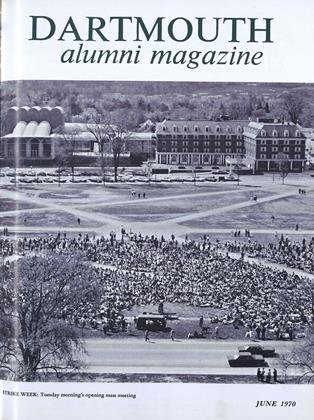There has never been a Dartmouth heavyweight varsity crew among the finalists of the Eastern Sprint championships - until 1970. The Indians have been aiming to make this spring the best in Dartmouth rowing history and it looks like they are succeeding.
This is written on the eve of what should be a relatively easy victory over Syracuse and M.I.T. in the Packard Cup on Onondaga Lake in Syracuse. With that victory, the Indians will complete an undefeated season of cup racing.
Starting back in late March when Coach Peter Gardner's oarsmen breezed past Alabama in a windup to the spring training session on Alabama's Lake Martin, the Dartmouth heavies have progressed steadily. "We have to continue to improve," said Gardner, "if we expect to be a contender at the IRA championships at Syracuse in June."
The Indians are improving steadily. They borrowed a shell from M.I.T. after the Bill Cup regatta was moved from the Connecticut River to the Charles (due to spring debris) and proceeded to take a convincing win from Boston University and Rutgers. A week later, they again borrowed a shell, from Wisconsin, and came home from Lake Mendota with another solid win over the Badgers and M.I.T. in the Cochrane Cup. Wisconsin had been the only cup victor over Dartmouth last year.
The Sprints, on Lake Quinsigamond in Worcester, were billed as a confrontation between Penn and Harvard with everyone else along for the ride. It turned out that way, too, but the Indians weren't that far off the pace that Gardner couldn't feel assured that his eight will be among the leading challengers to Penn at the IRAs.
Harvard won the race for the seventh straight year, avenging a loss to Penn the week before in the Adams Cup race. Dartmouth won its morning trial heat ahead of Princeton, Navy, Columbia and M.I.T. In the finals, the Indians finished fourth with Harvard winning the 2000-meter race in 5:54.1. Penn's time was 5:55.9 and the two leaders spent the entire race at a beat that was 6-8 strokes per minute higher than Dartmouth's.
The Indians, holding a 31-32 stroke pace through the body of the race, were unable to overtake Princeton which finished in 5:59, and crossed in 6:01, edging Cornell (6:01.3) and Brown (6:02.6).
"If we can get our basic stroke up to 36, I think we can be a surprise at the IRAs," said Gardner, whose oarsmen were second to Penn last year at Syracuse. "We have good stroke efficiency. We just need to build our rate."
 View Full Issue
View Full Issue
More From This Issue
-
 Feature
FeatureFor Want of a Better Word They Called It a Strike
June 1970 By DAVID MASSELLI '70 and WINTHROP ROCKWELL '70 -
 Feature
FeatureSix Professors Reach Retirement
June 1970 -
 Feature
FeatureNew Environmental Studies Program To Be Launched in the Fall
June 1970 By ROBERT B. GRAHAM '40 -
 Feature
FeatureThe Class Officers Weekend
June 1970 -
 Article
ArticlePRESIDENT KEMENY'S RADIO TALK
June 1970 -
 Article
ArticleWhat the Workshops Meant
June 1970 By GUY DE MALLAC-SAUZIER
JACK DEGANGE
-
 Article
ArticleSports Schedule
November 1968 By JACK DEGANGE -
 Article
ArticleSWIMMING
FEBRUARY 1969 By JACK DEGANGE -
 Article
ArticleGREEN JOTTINGS
OCTOBER 1969 By JACK DEGANGE -
 Article
ArticleGOLF
JUNE 1970 By JACK DEGANGE -
 Article
ArticleBig Green Teams
November 1973 By JACK DEGANGE -
 Article
ArticleThe Trials of Reggie
September 1975 By JACK DEGANGE
Article
-
 Article
ArticleFACULTY POLICY FOR THE UNDERGRADUATES
May 1917 -
 Article
ArticleTrustee nomination: a reminder
OCTOBER 1984 -
 Article
ArticleMasthead
OCTOBER 1996 -
 Article
ArticleThe Iron Major
DECEMBER 1996 -
 Article
ArticleGordon Ferrie Hull
June 1940 By STEARNS MORSE PROFESSOR OF ENGLISH -
 Article
ArticleTeacher Network Established
June • 1985 By Steven R. Lipscomb '84


